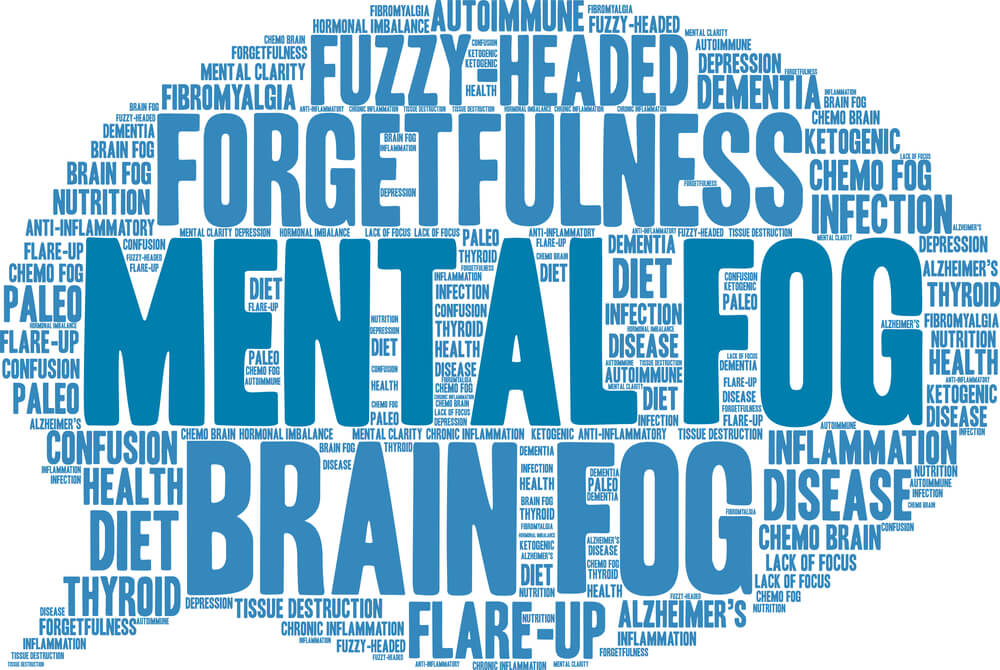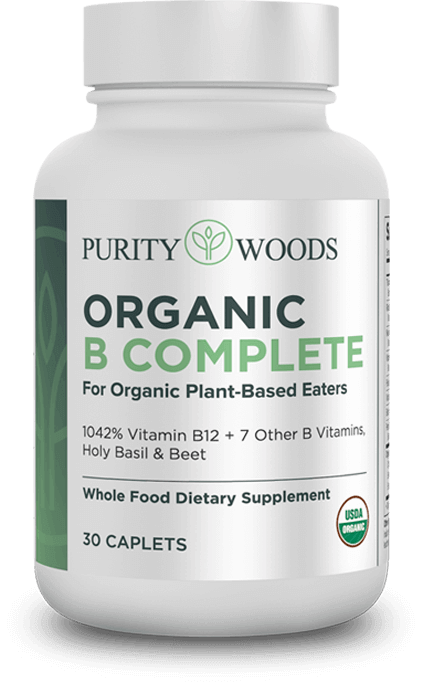Brain fog is a term used to describe a range of cognitive symptoms that can have many causes. Feeling unfocused, “hazy,” and mentally fatigued all fall into the category of brain fog as do many other symptoms.
You’ve probably experienced a tired or unfocused brain at some point, but the real problem is when these symptoms become chronic.
Not only is living with a less-than-sharp brain and constant “fogginess” frustrating, it usually indicates some kind of underlying condition.
Because brain fog is a complex issue, it usually takes some digging to figure out what the root problem is. But with a little detective work, it can usually be treated, often by natural means.
Here’s a closer look at the potential symptoms and causes of brain fog, plus the best natural treatments that can really help to clear your mind.
What Is Brain Fog? Main Symptoms

Brain fog is not technically a medical condition. It’s usually considered a symptom or side effect of something else, which means it has an underlying cause- medical or otherwise.
Unfortunately, brain fog has become the new normal for many people. It’s often a byproduct of modern life and shows up in many ways.
The name itself indicates the main symptoms: a cloudy or foggy mind, difficulty thinking or remembering, the opposite of being clear-headed.
However, brain fog can also include any of the following symptoms:
- Mental fatigue
- Mild depression
- Poor memory
- Frequent confusion
- Difficulty making decisions
- Trouble concentrating or focusing
- Lack of clarity
- Low motivation
- Trouble recalling words
- Trouble calculating, problem solving, or planning
To add insult to injury, brain fog often shows up alongside other problems like headaches, chronic fatigue, insomnia, and anxiety or depression.
Potential Causes of Brain Fog
Not Enough Sleep (or Sleep Disruption)

Sleep is needed for all parts of your body to stay healthy, particularly your brain. Some revealing research even indicates that sleep plays a key role in removing toxins from the brain that build up during waking hours.
This is likely part of the reason why lack of sleep appears to be one of the most common triggers for brain fog.
Quality of sleep is important, too. There are four different stages of non-REM sleep your body needs to go through to get the most restorative effects. Learning and memory seem to be most connected to these sleep stages, though REM sleep plays a role as well.
Even one night of poor sleep can make your brain feel foggy, but the accumulated effects of sleep deprivation often make brain fog become a chronic problem.
Poor Diet and Food Sensitivities
Diet plays a huge role in brain health. Your brain constantly needs good quality fuel, including lots of vitamins, minerals, and antioxidants. Fatty acids (especially omega-3s) are also important.
If your brain is deprived of these nutrients, or fed poor quality alternatives, its function will eventually become impaired.
This is why a nutrient-deficient diet is top of the list for potential causes of brain fog. Your brain isn’t getting what it needs from food, so it continues to function but in a poorer, cloudy way.
Eating a lot of highly processed food can be especially detrimental to brain health because they lack the nutrients of whole foods. Diets high in refined sugar are also very harmful to the brain.
Food allergies and sensitivities are another issue.
Instead of receiving good nutrients from food, your body is reacting to certain substances as though they were a threat. If you notice brain fog developing after eating certain foods, this may be your problem.
Nutrient Deficiencies

As mentioned, your brain depends on a diverse supply of nutrients to stay healthy.
Diet, of course, plays a big role in what nutrients your brain is getting, but there’s also the chance your body may not be absorbing all the nutrients you’re eating. This could be from poor gut health, an underlying disease, etc.
It’s also possible to be eating healthy foods but missing out on some important vitamins or minerals.
Research indicates that the B vitamins (including B12, which many can be particularly low in, especially if you are a plant-based eater or older), along with omega-3s, vitamin D, and flavonoids (a type of antioxidant) are essential. Magnesium is a very important mineral for brain health and one many people may be low in.
If you suspect a deficiency may be behind your brain fog, it may be worth getting a test done to find out.
Dehydration
Not only is a good diet essential for brain health, so is water!
Water is one of the elements your body most needs. It makes up around 60% of the body and is used by every cell, including brain cells. Water also helps to transport oxygen and nutrients that are critical for healthy brain function.
This means that even mild dehydration can be a cause of brain fog. In fact, studies indicate that being dehydrated hurts memory, focus, mood, and even affects brain structure.
Besides simply not drinking enough water, overconsuming caffeine and alcohol can dehydrate your body. It’s also worth noting that a processed foods diet can be dehydrating because it leaves out the water content found in many whole fruits and vegetables.
Chronic Stress and Overstimulation

Chronic stress has a whole host of negative effects on your body. It can induce mental fatigue, hurt memory, and depress your mood. If not dealt with, stress can turn into chronic brain fog.
Studies reveal extremely alarming long-term effects of stress on the brain. Most notably, chronic stress can kill brain cells and change the structure of your brain. Specifically, it can shrink the prefrontal cortex, which is the part of your brain associated with learning and memory.
An often overlooked aspect of stress in the modern world is overstimulation.
Our brains are almost always “on” due to the never-ending stimulation around us (usually coming from some type of screen). When your mind doesn’t get a break, fatigue is likely to set in, which eventually leads to brain fog.
Chronic Inflammation
At a cellular level, chronic inflammation is usually involved in all the other causes of brain fog, but it does deserve some attention of its own.
Low-level, chronic inflammation is thought to be involved in the development of many chronic diseases. This includes brain diseases like Alzheimer’s as well as a general decline in cognitive function.
If you have symptoms of brain fog, chances are good you’re also dealing with some kind of inflammation. Lowering it is a key part of boosting your brain’s recovery.
To lower it, you’ll need to address other issues on this list like chronic stress, diet, and sleep. (Herbs like turmeric can help as well.)
Hormonal Imbalance

Hormonal imbalance is often tied to brain fog in some way. Hormones like cortisol, dopamine, and serotonin are all involved in how clear, alert, and “happy” your brain is. Unbalanced levels can bring about brain fog as well as mood disorders.
For women, changing levels of estrogen and progesterone often induce brain fog. For this reason, some women may only experience it around their menstrual cycle.
Dropping estrogen levels during menopause can also lead to a foggy brain, particularly where memory is concerned.
Underlying Diseases & Certain Medications
Brain fog can also be the result of an underlying disease.
Gastrointestinal disorders that impair nutrient absorption (Crohn’s disease, celiac disease, etc.) are a frequent culprit as are multiple sclerosis, lupus, and chronic fatigue syndrome. Thyroid disorders and other diseases that impact hormones can cause brain changes, too.
Certain medications may be the cause of your brain fog as well. It’s also a frequent side effect of chemotherapy treatments.
Natural Treatments for Brain Fog
The hardest part of getting rid of brain fog is discovering the root cause. It can often be treated naturally by changes you make yourself but only if you can get to the underlying problem. (Of course, medical issues will need further intervention.)
You may need to try several, or a combination, of these treatment options to discover what your brain really needs.
Watch Sugar & Focus on Healthy Carbohydrates

Though overconsuming sugar can contribute to brain fog, it’s important to understand that sugar isn’t entirely “bad” in this context. Your brain actually uses glucose (sugar) as its main energy source.
However, it’s still important to largely avoid refined sugar because it can cause inflammation and harm your brain.
You can easily get all the glucose you need from fruits, other whole foods, and moderate amounts of natural sweeteners like raw honey.
Carbohydrates are another category often labeled as being bad for your health. Yet, healthy carbs feed your brain and can help lower inflammation levels. Focus on switching out refined, processed carbs for the complex, whole grain versions.
Consume Quality Protein and Fat
Both fatty acids and amino acids (from protein) are essential for healthy brain function. Fats are also needed for healthy hormone levels and to lower inflammation.
What’s really important is the quality of protein and fat in your diet.
Avoid rancid or highly refined vegetable oils and too much saturated fat from animal sources.
Instead, as you get older, it becomes increasingly important to eat a range of plant proteins. Hemp seeds, for example, are a “perfect protein.” Avocados, nuts, and seeds are examples of good plant-based sources of fat.
Hydrate (All Day!)
Dehydration is a common cause of brain fog, so give your brain a steady supply of water. Try to drink consistently throughout the day, and take in more liquids when you exercise.
Pure water is often what your body craves (as long as it’s toxin-free water). Eating more whole foods with natural water content will also help you stay hydrated.
Load Up On Antioxidants

Consuming antioxidants regularly is one of the best ways to lower chronic inflammation and boost brain health. They are known to fight free radicals that can cause oxidative stress in the brain and throughout your body.
Many fruits and vegetables are loaded with antioxidants as are herbs and spices.
Mushrooms are loaded with certain antioxidants that can be especially helpful for your brain and other aspects of healthy aging.
Eat more of these antioxidant-rich foods to benefit your brain (and overall health).
Prioritize Sleep
Getting high quality sleep is tough for many people. The average adult needs 7-9 hours of sleep each night, but many adults aren’t getting close to that.
Besides directly contributing to brain fog, chronic lack of sleep often leads to hormone imbalances. This is because sleep deprivation raises cortisol levels, which in turn depresses dopamine and hinders serotonin. All this can make brain fog more permanent.
Commit to getting the minimum of 7 hours of sleep each night, and try to go to bed around the same time every night. Also try to avoid looking at TV, computer, phone and other screens at least two hours before bed, as they emit “blue light” which can interfere with healthy sleep.
You may also find it beneficial to use herbs or foods for sleep to improve the quality of your rest and help you fall asleep at night.
Manage Stress
Constant stress has a negative effect on your brain like nothing else does. It’s impossible to get rid of it entirely, but brain fog is unlikely to clear if you can’t find ways to deal with stress.
Another aspect to consider is potentially limiting how much time your brain spends being stimulated. This could mean turning alerts off on your phone, taking up meditation, or simply going on long, screen-free walks.
Also, try to do something each day that’s purely fun. This “turns on” portions of your brain that aren’t active while you’re working, scrolling, etc.
Exercise Daily (Or Close to It)

Regular exercise is vital to brain health and also helps combat several causes of brain fog. It can help to lower inflammation, help you sleep better, and improve blood flow to the brain.
Moving your body in exercise also stimulates the lymphatic system, which is largely responsible for moving toxins that may be contributing to brain fog out of your body.
Keep in mind that exercise doesn’t have to be strenuous to be effective. In fact, you can get great benefits from gardening, walking, and other types of moderate activity.
Address Hormone Issues
Bringing hormones back into balance is essential for clearing brain fog. Hormonal health is frequently a complicated issue, but eating a better diet, sleeping well, managing stress, and exercising will all help.
It’s also important to be aware of and avoid endocrine disruptors hiding in food, cosmetics, etc. These can wreak havoc on your hormones and make it very difficult to recover balance.
You may also want to consult with a holistic practitioner who can give more tailored advice.
Clean Toxins (And Allergens) Out of Your Life
It can’t be overstated how important lowering your toxic load is for overall health. An overload of chemicals hurts your body’s natural healing process and sneakily contributes to brain fog.
Avoid dangerous pesticides by eating organic when possible. Also, keep a lookout for toxins hiding in cosmetics and other products you apply to your skin. Switching to natural cleaning products will help clear up the air you breathe in everyday.
If you suspect a food sensitivity, get tested for allergies or try an elimination diet to see if that helps clear your brain fog.
Consider Certain High-Quality Supplements

Sometimes, your body needs an extra boost to help it heal. Certain supplements may be especially helpful for brain fog when combined with other changes like a clean diet, exercise, etc.
Certainly consider a top-quality organic supplement providing all eight essential B vitamins — including the vitamin B12 that many people can be low in.
Meanwhile, adaptogens are a type of herbal supplement that help to rebalance your body and promote recovery from stress and fatigue. They can be especially helpful if the cause of your brain fog is stress, overstimulation, or fatigue-related. Some also help with sleep (ashwagandha, for example).
Omega-3s (as fish oil or a vegan algae supplement) and magnesium can also be helpful.
And because eating a range of mushrooms may be a very powerful way to help brain fog — research shows they may even help prevent cognitive decline — taking a high-quality mushroom supplement can be a very smart step, too.
Clearing Brain Fog
Usually tied to fast-paced living, nutrient deficiencies, toxin overload, and hormonal imbalances, brain fog is a very real problem that can often be cleared with a holistic approach.
Making lifestyle changes that lower chronic inflammation, reduce stress, and “feed” your brain will go a long way toward getting a clearer, sharper mind.
And don’t forget the “simple” things like exercise, sleep, and slowing life down. You may be surprised at how much better your brain feels with just a little rest!
Next Up: Top-Recommended Supplement for Your Brain and More
As covered in brief above, a highly effective and independently verified organic supplement that provides you all eight essential B vitamins — including ample amounts of safe vitamin B12 from fermented, natural sources — is one of the smartest supplements you can take for your brain and more.
And Purity Woods’ Organic B Complete meets ALL the requirements you’re looking for to support your brain, as well as your energy levels, mood, heart, joints, skin health and more.
(And right now — as you’ll see right here — you’re getting Organic B Complete for up to 32% OFF with FREE U.S. shipping if interested!)
Seeing a huge gap in the market for a highly effective vitamin B complex that was also truly USDA Certified Organic and safe, Purity Woods set out to create the most effective vitamin B supplement available anywhere — and it is literally guaranteed that you’ll feel the difference and agree it is the best!
Purity Woods’ Organic B Complete provides you:
–> A proper balance of all 8 essential B vitamins
–> A safe and effective 25 mcg of vitamin B12 (that’s over 1000% of the DV from a Certified Organic & fermented natural-sourced B12!)
–> Whole food sources such as beet root, guava, and holy basil
–> A fully USDA Certified Organic formula (supplements in general are perhaps THE products with the most synthetic and potentially toxic contaminants that people put into their bodies, so this is HUGE)
–> Vegan, gluten-free, dairy-free, non-GMO
–> Simple to take — just 1 caplet daily
–> A portion of proceeds from every order go to the One Tree Planted charity, planting trees in your honor in devastated areas
–> A full 60-Day Total Satisfaction Money-Back Guarantee, where you can return even empty bottles if you don’t LOVE the difference you’ll feel




Thank you for your articles.
Hi Ina, thank you!
Where can you buy Neuroeffect?
Hi Sue, click the “Neuroeffect” link above or the picture of the bottle. Thanks!
Great article! As a massage therapist, I hear complaints about all these issues!
I am going to forward this information to several patients right away
Thank you for sharing this informative article.
10 Apr 2021
A very good article – informative and life-changing. I think I can benefit a lot by putting Brian’s advice into practice.
George
Great information! Brain Fog can be a real issue. All we can do to help is beneficial. Thanks
You always have such alot of good suggestions. Thank-you for all of the help that you give to others.
Thank you for your article
Thank you for your articles. Drinking enough water is a problem for me because I am rarely thirsty. So I am going to put up “Hydrate. All Day” signs all over my house to remind me.
I have the same issue – not drinking enough water!
Love the sign idea. Has drinking more water made a difference for you?
Thank you very much for all of the great information. This can really help a lot of people.
thanks I usually do most of the things you recommend, but now I know it helps more than I thought thanks again
Great article! Sounds like something that can very well help.
I will give Neuro Effect a try. Thanks Brien
I REALLY APPRECIATE YOUR INSIGHTFUL INFORMATION AND
CONGRATULATE YOU FOR YOUR RESEARCH AND HARD WORK!
THANK YOU!
Excellent info; I think some of it was covered in your book which I purchased through:
“Younger, Longer! “ Which was a Great Docu Series!
Thank you again;
Cristela
Thanks for the awesome information and recommendations.
I didn’t see any reference to “Post-Covid syndrome” however. (I prefer to call it that rather than “Long-Covid”. But there are of course many many people suffering the after affects of having had Covid however mild. I believe your information and recommendations will definitely benefit anyone with or without any of the conditions mentioned (including post-Covid). So thank you again. Regards, Lynda, NZ